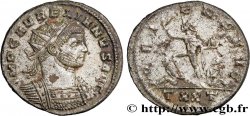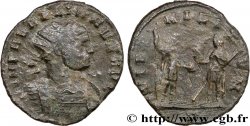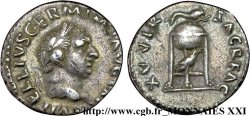v16_0658 - AURÉLIEN Antoninien
MONNAIES 16 (2002)
起拍价 : 150.00 €
估价 : 300.00 €
竞价记录 : 275.00 €
出价数量 : 2
最高出价 : 330.00 €
起拍价 : 150.00 €
估价 : 300.00 €
竞价记录 : 275.00 €
出价数量 : 2
最高出价 : 330.00 €
种类 Antoninien
日期: fin 271 - automne 272
铸币厂名称/城市 Atelier indéterminé (Byzance)
材质 billon
纯度、成色(用角密度) + 20 ‰
直径 21,5 mm
模子方针 12 h.
重量 4,69 g.
稀少度 R3
发行人: 1re
关于品相的说明
Flan large et ovale. Fêlure de frappe au revers à six heures. Jolie patine marron. Beau revers
出版目录中的项代码 :
正面
正面的文字 IMP AVRELIANVS AVG.
正面的说明书 Buste d’Aurélien, tête radiée, à droite, avec cuirasse, vu de trois quarts en avant (B).
正面的翻译 “Imperator Aurelianus Augustus” (Empereur Aurélien auguste).
背面
背面的文字 IOVI CONSERVA-TORI// (DAUPHIN).
背面的说明书 Aurélien lauré, en habit militaire, debout à droite, tenant un sceptre court de la main gauche et tendant la droite vers Jupiter nu, le manteau sur l’épaule gauche, debout à gauche, présentant un globe de la main droite et tenant une haste de la gauche.
背面的翻译 “Iovi Conservatori” (À Jupiter le protecteur).
评论
Poids lourd. Un seul exemplaire de ce type dans le catalogue de La Venèra.
Heavyweight. Only one example of this type in the La Venèra catalog.
Heavyweight. Only one example of this type in the La Venèra catalog.








 对产品描述纠错
对产品描述纠错 打印
打印 分享我的选择
分享我的选择 提问
提问 Consign / sell
Consign / sell
 产品介绍
产品介绍









